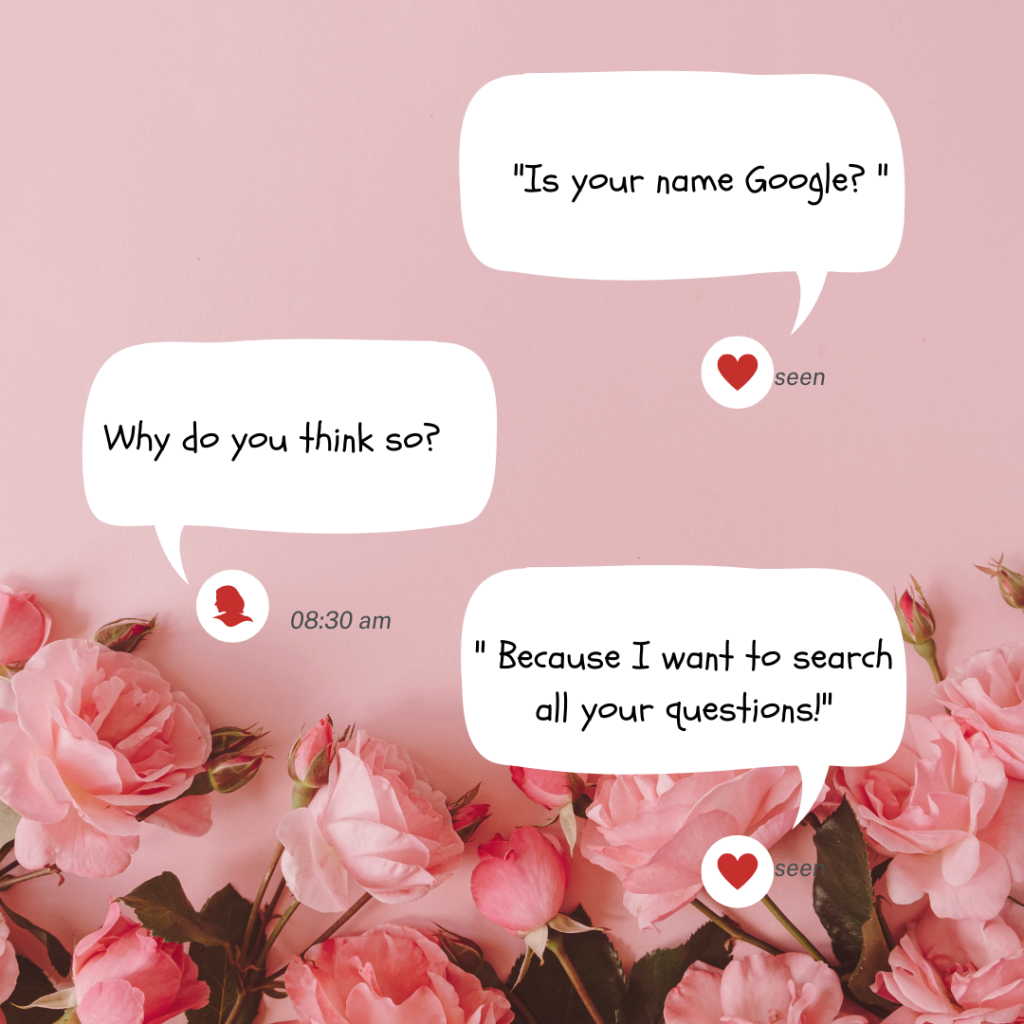In the digital age, our love stories often start with the first sentence on the screen. Imagine, on an ordinary weekend, you’re scrolling through a dating app, and suddenly, an interesting profile catches your eye. Your heart races, your mind starts spinning, and you realize that this time, you really want to make a lasting impression. You know that a well-chosen conversation starter might just be the first step towards a wonderful relationship.
Leo is a young man who loves to travel. Once, on an online dating platform, he noticed the profile of a girl named Sara who also enjoyed traveling. Sara’s profile included a photo of her standing on a beach in Bali, her smile radiant in the sunlight. Leo decided not to use cliché conversation starters and instead came up with a creative way to get her attention.
He wrote, “Hello Sara! I saw your photo in Bali. I’ve also welcomed the sunrise on that same beach. The scenery there is unforgettable. Did you also feel the magic of that place? By the way, I’m curious, what was the most memorable moment of your trip to Bali?” This message not only showed his genuine interest in her but also naturally led to a deeper conversation topic.
This way of starting a conversation, based on shared interests and experiences, not only captures the attention of the other person immediately but also allows the conversation to continue in a relaxed and pleasant manner. This strategy shows more attention to the other person’s personality and an eye for detail compared to a simple “hello” or “how are you?”
Through Leo’s story, we can see how a good conversation starter can successfully spark interest in Sara and begin a potentially promising conversation. Such stories remind us that every interaction is an opportunity to present ourselves and understand others, and a good conversation can bring people closer together unintentionally.
Now, back to your own story, when you’re ready to send that crucial first message to someone you like, consider how you can touch their heart with your words and resonate. In this era of information overload, a creative and thoughtful conversation starter might just be the key to unlocking a beautiful relationship. However, creating an interesting conversation starter requires some skills and strategies. This article will explore how to effectively start conversations and provide some unique examples to help you connect better with your desired partner.
“Words are like keys. If you choose them right, they can open any heart and shut any mouth.”
Hazrat Ali Ibn Abu-Talib A.S.
1. Finding Common Ground
This type of conversation starter builds connections by finding common interests or activities, as shared interests form a good foundation for relationships.
- “I see you also enjoy skiing. What’s your favorite ski resort?”
- “We both love photography! Have you taken any photos recently that you are particularly proud of?”
- “I noticed you’re a coffee enthusiast. Where is your favorite coffee shop?”
- “Your profile mentions you like baking. What is your proudest creation?”
- “We both enjoy hiking. What’s your most unforgettable hiking experience?”
2. Asking for Advice
Asking for advice shows that you respect their opinions and encourages further conversation.
- “I want to learn guitar. Do you have any good tutorials to recommend?”
- “I’m looking for a good book to read. Do you have any recommendations?”
- “I plan to redecorate my room. Do you have any style or brand recommendations?”
- “Your profile says you like yoga. Do you have any tips for beginners?”
- “I’m trying to improve my diet. Do you have any good recipes or food recommendations?”
3. Using Humor
Humor is a great way to break the ice and can instantly make the conversation more relaxed, but make sure the humor is appropriate and does not offend.
- “I give my cooking skills a 10 because I excel at burning toast. What’s your specialty dish?”
- “If committing a taste crime was actual crime, I’d be serving a life sentence every time I cook! Have you had any kitchen disasters?”
- “I find my plant care skills are as good as my dancing skills, both are absolutely awful. Do you have any ‘special’ skills?”
- “If life gives you lemons, would you make lemonade or just sell the lemons for profit?”
- “Speaking of sports, my best one is long-distance channel surfing. What’s your ‘best’ sport?”
4. Posing Thought-Provoking Questions
Asking thought-provoking questions stimulates thinking and guides the conversation into deeper discussions.
- “If you could have dinner with any historical figure, who would it be?”
- “If you could wake up tomorrow having gained any one quality or ability, what would it be?”
- “Which book do you think should be turned into a movie, but the film industry has ignored so far?”
- “If you had to live forever in the world of a movie, which one would you choose?”
- “Would you rather have the ability to travel through time or read minds? Why?”
5. Sharing Personal Stories
Sharing personal stories shows your personality traits and makes the conversation more human.
- “Yesterday, while walking in the park, a little dog played with me for half an hour, completely made me forget my stress. Do you have any similar small joys?”
- “I recently tried skydiving; although I was scared at first, it was exhilarating. Have you done anything that excited you?”
- “Once during a trip, I got lost and ended up discovering a hidden beautiful village. Have you had any similar unexpected discoveries?”
- “Last week, I tried making my own pizza, and the taste was surprisingly good. Have you tried any new dishes that surprised you?”
- “Lately, I’ve been learning how to paint with watercolors. Not very professional, but I enjoy the creative process. Do you have any hobbies?”
6. Commenting on the Current Situation or Environment
Commenting on your shared living environment or current news events shows your awareness of the world around you.
- “Did you go to the music festival this week? What kind of interesting performances were there?”
- “The weather around here has been changing so rapidly lately, which type of weather do you prefer?”
- “I noticed we’re both in San Francisco. Do you have any special weekend getaway spots to recommend?”
- “What do you think of the nightlife in this city? Any good places to recommend?”
- “A new art exhibition just opened up here. Are you interested in checking it out?”
7. Utilizing Recent Pop Culture
Discussing recent pop culture events shows your sense of style and being up-to-date.
- “Have you watched the latest season of ‘Stranger Things’? What did you think?”
- “What song has been on repeat on your playlist recently?”
- “Which recent popular TV shows or movies have you followed? Any good recommendations?”
- “The Oscar nominations were recently announced, do you have any favorite movies or actors?”
- “What are your expectations for the upcoming Marvel movie?”
8. Discussing Technology and Innovations
Discussing recent tech news or innovations can engage someone interested in technology.
- “Have you tried the latest virtual reality game? How was it?”
- “What are your thoughts on the recent developments in artificial intelligence?”
- “Which apps do you use to enhance your work efficiency or quality of life?”
- “Have you read any interesting articles on tech innovations recently? Can you share?”
- “How do you think technology will impact our lives in the next ten years?”
9. Expressing Sincere Compliments
Showing your appreciation for specific traits or achievements of the other person through sincere compliments.
- “You take beautiful photos, I really like that picture of you at the beach, it seems so storied.”
- “Your job sounds interesting, can you share more about your day-to-day work?”
- “I was impressed by your blog post about traveling, well written.”
- “Your dog looks so cute, can you share more pictures of it?”
- “I noticed you like design, do you have your work displayed online? I’d love to see it.”
10. Sharing Life Hacks or Tips
Sharing small tips or tricks about everyday life shows your practicality and creativity.
- “I recently discovered a new way of folding clothes that saves a lot of space, would you like to try?”
- “I’ve found some super practical apps that help manage time and tasks, interested to know more?”
- “If you like indoor gardening, I can share some simple home gardening tips.”
- “As a movie enthusiast, I have some tips for picking movies that ensure you won’t end up with a dud!”
- “I’ve been learning a language recently and found some effective methods for memorizing words, might be helpful to you too.”
“The first impression is the last impression.”
Will Rogers
11. Discussing Future Dreams and Goals
Discussing their dreams and future plans can deepen the conversation, showing that you’re interested in their long-term aspirations and ambitions.
- “Do you have any long-term goals or dreams you’re working towards?”
- “If you had the chance to start your own business, what would you do?”
- “What are some things you really hope to achieve in the next five years?”
- “How do you hope your life changes in the future?”
- “If you could change careers, what field would you choose? Why?”
12. Appreciating Culture and Arts
Sharing an interest in art and culture can display your depth and taste.
- “Who is your favorite writer and why?”
- “Have you been attracted by any recent art exhibitions?”
- “Do you enjoy going to the theater to watch plays? What good plays have you seen recently?”
- “Are you interested in modern art? Do you have any favorite artists or works?”
- “How do you view the relationship between movies and literature? Any recommended movies that were adapted from books you love?”
13. Stories of Challenges and Overcoming Difficulties
Sharing stories of facing challenges and difficulties can show your resilience and growth.
- “Do you have any life experiences that particularly challenged your views or abilities?”
- “What is the most proud moment of overcoming difficulties in your career?”
- “How do you deal with stress and challenges at work?”
- “When facing difficulties, how do you usually seek help or resources?”
- “Have you ever experienced a failure that later taught you valuable lessons?”
14. Environmental and Sustainable Living
Discussing topics related to environmental conservation and sustainable living shows your sense of responsibility and concern for the future.
- “Do you practice any environmental habits in your daily life?”
- “Interested in sustainable fashion? How do you usually choose your clothes?”
- “What role do you think we as individuals can play in addressing climate change?”
- “Have you tried living a zero-waste lifestyle? What challenges did you encounter?”
- “How do you view the future of electric vehicles and renewable energy?”
15. Health and Fitness
Discussing experiences and goals related to health and fitness can enhance empathy and show your emphasis on quality of life.
- “Do you follow any specific fitness plans or dietary habits?”
- “What new health foods or supplements have you tried recently?”
- “How do you balance work and a healthy lifestyle?”
- “Are there any fitness activities that particularly excite or relax you?”
- “In what ways do you think health most significantly affects life?”
16. Exploring Interests and Hobbies
Discussing each other’s interests and hobbies can increase interactivity and points of interest.
- “What do you usually like to do to relax on weekends?”
- “Do you have any unusual or quirky hobbies you’d like to share?”
- “Have you discovered any new interests or activities recently?”
- “Are you part of any interest groups or clubs?”
- “If you could turn any hobby into a profession, which one would you choose?”
17. Food and Cooking
Food always arouses people’s interest and enthusiasm, making it an evergreen topic.
- “What’s your favorite dish? Can you share the recipe?”
- “Have you tried any new recipes or restaurants recently?”
- “Do you prefer cooking at home or dining out?”
- “Do you have any favorite cuisines or beverages?”
- “If you could go on a culinary tour anywhere, where would you choose?”
18. Music and Movies
Starting a conversation through music and movies can help you understand the other person’s cultural tastes and emotional inclinations.
- “What music have you been listening to lately? Any favorite artists or bands?”
- “Have any movies changed your views or way of life?”
- “What’s your all-time favorite movie? Why?”
- “If you could have dinner with one musician, who would you choose?”
- “Are there any upcoming movies or music events that you’re particularly excited about?”
19. Travel and Adventure
Sharing travel experiences or discussing future travel plans can create dreams and anticipation.
- “What is your most unforgettable travel experience?”
- “Do you have a dream travel destination? Why do you want to go there?”
- “What type of places do you like to explore when traveling?”
- “Do you have any travel plans coming up?”
- “In traveling, do you prefer independent trips or organized tours?”
20. Books and Reading
Discussing books can show your depth of thought and breadth of knowledge.
- “What’s the last book you read? What impression did it leave on you?”
- “Do you have a book that you’ve read multiple times? Why?”
- “What types of books do you enjoy?”
- “What does reading mean to you?”
- “If you were to recommend one book to me, which would it be? Why?”
“The secret of getting ahead is getting started.”
Mark Twain
21. Small Discoveries and Pleasures in Life
Sharing the small things in life can show your observational skills and love for everyday life.
- “Today I discovered a hidden bookstore in an alley, felt like stepping into another world. Have you had any similar little discoveries?”
- “I’ve been learning how to make coffee recently, and my daily pleasure is trying new coffee beans. Do you have any similar everyday little pleasures?”
- “I attended a local arts and crafts market over the weekend and saw many creative works. Do you like visiting such markets?”
- “I tried making a time capsule with old photos, it was a meaningful reminiscence. Have you tried any similar projects?”
- “Recently, I discovered a frequent visiting little bird in my garden, it has become my daily anticipation. Are there any wildlife visitors near your home?”
22. Psychological and Emotional Exploration
Deep psychological or emotional topics can show your sensitivity and understanding of human nature.
- “Do you think it’s a big challenge to maintain a balance between personal identity and social circles in modern society?”
- “Was there a moment that changed your perspective on something?”
- “What do you think is real happiness?”
- “What in your life has given you the greatest psychological support?”
- “How do you view the relationship between failure and success?”
23. Creativity and Design
Discussing the creative process and design can attract the other person’s interest in aesthetics and creativity.
- “If you could design a product to improve everyday life, what would it be?”
- “How do you view the integration of modern design and traditional art?”
- “Is there a design that has truly impressed you?”
- “What role does creativity play in your work or daily life?”
- “What is your favorite home decor style? Why?”
24. Social and Global Issues
Discussing important social or global issues can show your knowledge and concern for the world.
- “How do you view the current environmental issues?”
- “Have you been following the recent global economic trends?”
- “Do you think technological advancements are more beneficial or harmful to society?”
- “What recent social changes have particularly caught your attention?”
- “What issues do you think will be the focus of international attention in the next decade?”
25. Personal Growth and Self-improvement
Discussing personal growth can help you understand the other person’s values and attitudes towards life.
- “What new skills have you learned recently for personal development?”
- “Is there a habit that has changed your life?”
- “How do you balance work and personal life?”
- “What are some things you are currently trying to improve in your life?”
- “What personal qualities do you think are most important, and why?”
26. Science and Technology
Discussing technological advancements can show your curiosity and attention to the future.
- “What are your thoughts on the future development of artificial intelligence?”
- “Have you read about any exciting scientific discoveries recently?”
- “How do you view the latest advancements in space exploration?”
- “Are there any particular technological developments you look forward to or worry about?”
- “What do you think is the most important aspect of how technology is changing education?”
27. Work and Career
Discussing work-related topics can help you understand the other person’s attitude towards their career and their future goals.
- “What is the most challenging thing you have encountered at work?”
- “Has there been a turning point in your career?”
- “What is your ideal work environment?”
- “Do you have a dream job?”
- “Is balancing work and personal life important to you? How do you balance it?”
28. Education and Learning Experiences
Sharing learning experiences and educational backgrounds can foster mutual understanding and respect.
- “What was your favorite course in school? Why?”
- “Did you have a teacher or mentor during your student days who particularly influenced you?”
- “Do you enjoy learning new skills or courses on your own?”
- “What role does education play in your family?”
- “Is there a subject you are particularly good at or interested in?”
29. Volunteering and Public Service
Discussing public service activities can show your compassion and contribution to society.
- “Have you participated in any volunteer services?”
- “What was the most impactful public service experience you had?”
- “How do you view the importance of individual involvement in community service?”
- “Are there any social issues you are particularly concerned about?”
- “Do you have plans to participate in any type of public service activities in the future?”
30. Personal Philosophies and Beliefs
Discussing personal beliefs and life philosophies can deepen understanding of each other’s core values.
- “Do you have any principles or beliefs you hold dear in life?”
- “How do you define success?”
- “Is there anything you believe one should never compromise on?”
- “What is your life philosophy?”
- “What is the most important life lesson for you?”
“Well begun is half done.”
Aristotle
31. Imaginative Hypothetical Questions
These questions stimulate the imagination by setting up fictional scenarios, making the conversation more interesting.
- “If you could have a superpower to help you with daily chores, what ability would you want?”
- “Imagine if you woke up tomorrow and found yourself in the Middle Ages, what profession do you think you would take up?”
- “If you could swap lives with any character from a book for one day, who would you choose?”
- “Imagine you can dine with any character from a movie. Who would you pick? What might they order?”
- “If you had the chance to design a perfect day filled with your favorite activities from morning to night, what would that day look like?”
32. Exploring Traditions and Festivals
Talking about cultural traditions and festival celebrations can show interest in and respect for diverse cultures.
- “What’s your favorite family holiday tradition? Are there special foods or activities?”
- “Have you ever participated in a cultural festival from another culture? What was it like?”
- “Is there a particular festival you look forward to every year?”
- “Which festival in your culture best represents the meaning of family?”
- “What was your favorite festival as a child? Do you have any fun stories to share?”
33. Quirky Ideas and Innovative Concepts
Engage the other person by discussing innovative ideas or future technologies.
- “If you could invent a new social media app, what unique features would it have?”
- “What technology do you think will have the biggest impact on our lives in the next decade?”
- “If you could use technology to solve a global issue, what would it be?”
- “Is there a tech product you think should be invented but hasn’t been yet?”
- “What are your thoughts on the use of artificial intelligence in creativity and the arts?”
34. Sharing Surprises and Delights
Sharing life’s surprises or delights can introduce a light and enjoyable topic.
- “This morning I unexpectedly found a movie ticket on the street, just for a movie I wanted to see! Have you had any unexpected good luck recently?”
- “I found a book I loved in childhood in an old bookstore, felt like discovering a treasure. Have you had any similar finds recently?”
- “I went hiking last weekend and unexpectedly discovered a beautiful waterfall, not even on the map! Have you had any similar exploration experiences?”
- “I saw a meteor shower on my evening walk yesterday, totally an unexpected delight! Have you had any similar experiences recently?”
- “I recently discovered a great tea in a small shop, now it’s my new favorite. Have you had any surprising tastes or new hobbies recently?”
In mastering the art of quality conversation starters, we explored various methods to initiate and sustain engaging and meaningful dialogues. Through these starters, we not only get to display our personality and interests but also delve deeper into understanding others, thereby establishing genuine connections in everyday life or online interactions. Each type of conversation starter is an opportunity to present our intelligence, sense of humor, compassion, and even our dreams and aspirations.

Summary of Key Points
- Stimulating Interest: A good conversation starter can pique the other person’s interest and keep the dialogue going. Asking about hypothetical situations not only stimulates the imagination but also leads to deeper discussions.
- Building Connections: By finding common ground and sharing personal stories, we can quickly establish emotional connections with others. As C.S. Lewis said, “Friendship is born at that moment when one person says to another, ‘What! You too? I thought I was the only one.’”
- Showing True Self: Through various types of conversation starters, such as discussing personal beliefs and life philosophies, we show our authenticity and depth. As Oscar Wilde said, “It is better to be hated for what you are than to be loved for what you are not.”
- Learning from Each Other: Asking for advice and discussing new learning experiences allows us to learn from others, thereby enriching our knowledge and laying the foundation for respect and mutual appreciation.
- Keeping Open and Respectful: Whether discussing global issues or sharing everyday little fun facts, an important principle is to keep the dialogue open and respectful of the other person’s opinions. As Benito Juárez said, “Respecting the rights of others is peace.”
📒 Practical Tips
When applying these conversation starters, remember the following tips:
- Personalize Appropriately: Choose the most suitable conversation starter based on what you know about the other person.
- Listen and Respond: The conversation starter is just the beginning; it’s important to listen to the other person and respond appropriately.
- Avoid Controversial Topics: When starting a conversation, avoid delving into potentially controversial topics like politics or religion.
- Use Humor: Appropriate humor can ease a tense atmosphere, making the dialogue more relaxed and enjoyable.
- Continue Exploring: As the conversation progresses, keep exploring new topics and starters to maintain the dialogue’s vitality.
Conversation starters are both an art and a science. With these strategies and examples, we can enter any social setting more confidently, not just to cope, but to establish sincere and meaningful human connections.
📖 Book Recommendations
1.《How to Win Friends and Influence People》- Dale Carnegie
A classic guide to interpersonal relationships, teaching how to build and maintain connections through effective communication skills.
2.《Nonviolent Communication》- Marshall Rosenberg
This book introduces a method of enhancing understanding and communication through compassion and empathy.
3.《Talk: The Science of Conversation》 – Elizabeth Stokoe
Explores how to use conversation analysis to improve interactions in both personal and professional contexts.
4.《Talking to Strangers》 – Malcolm Gladwell
Provides insights into the complexities of communicating with strangers, using fascinating real-life stories and psychological research.
5.《Crucial Conversations: Tools for Talking When Stakes Are High》- Kerry Patterson, Joseph Grenny, Ron McMillan, Al Switzler
Offers strategies for handling high-stakes conversations with confidence and skill, ensuring that dialogue remains constructive.
🎬 Movie Recommendations
1.《The Social Network》 (2010)
Chronicles the founding of Facebook by Mark Zuckerberg and explores how social media has transformed communication.
2.《A Beautiful Mind》(2001)
By depicting the life of mathematician John Nash, the film shows the importance of communication and relationships in maintaining mental health.
3.《When Harry Met Sally》(1989)
This classic romantic comedy explores the dynamics of male-female friendships and romantic relationships, highlighting the role of dialogue in developing connections.
4.《The Conversation》 (1974)
A thriller that delves deep into the ethics of privacy, eavesdropping, and dialogue.
5.《Midnight in Paris》(2011)
Through the protagonist’s time-traveling adventures in 20th-century Paris, where he converses with historical cultural figures, the film shows the breadth and depth of dialogue across eras.
🎵 Song Recommendations
1. “Hello” – Adele
Through lyrics that unfold over a phone call, the song expresses the complex emotions involved in reconnecting with an old friend.
2. “Say Something” – A Great Big World feat. Christina Aguilera
This song discusses the challenges of communication breakdowns and the struggle to express emotions effectively.
3. “Talk” – Coldplay
The song explores the difficulties and misunderstandings that can arise between people.
4. “I Just Called to Say I Love You” – Stevie Wonder
A classic song that emphasizes the importance of everyday communication and expressing feelings.
5. “Communication Breakdown” – Led Zeppelin
Reflects the frustration and tension that can arise from failed communications.
These books, movies, and songs not only enhance understanding of effective communication but also provide practical tools and inspiration to help readers succeed in building relationships and everyday conversations.
As we explore the art of effective conversation starters, we learn that good communication is the bridge to genuine connections, whether in online interactions or face-to-face conversations. Remember, every conversation is an opportunity to display our personality, compassion, and intelligence. By applying the knowledge gained from these carefully selected books, movies, and songs, we can continually improve our communication skills, enabling us to better understand others, express ourselves, and build more meaningful relationships. This is not just about enhancing conversational skills; it’s about opening a window to a richer world of interpersonal relationships.



